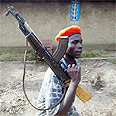
Fewer wars
צילום: איי פי
Study: World is safer
Canadian study: Armed conflicts, number of refugees down, but terrorism on rise
Armed conflicts have dropped 40 percent since the end of the Cold War and those that persist are killing far fewer people, says a three-year study that attempts to debunk current myths about war and peace.
But even if genocide and human rights abuses are receding, "high-casualty" attacks by terrorists are not, according to the Human Security Report prepared at Canada's University of British Columbia in Vancouver.
Nevertheless, international terrorism kills only a "tiny" number of people each year compared to those who die in war, the report said.
"We no longer have huge wars with huge armies, major engagements, heavy conventional weapons," said Andrew Mack, an academic and former U.N. official, who directed the study, funded by Canada, Britain, Sweden, Norway and Switzerland.
"Today's wars are low-intensity fought with light weapons, small arms in very poor countries. They are often extremely brutal but they don't kill that many people," he told a news conference.
The report found the total number of conflicts declined by 40 percent since the Cold War ended and the United States and Russia stopped funding proxy wars in developing nations.
The average number of deaths per conflict also dropped from 37,000 in 1950, during the Korean War, to 600 in 2002.
Number of refugees down
Between 1991 and 2004, 28 armed struggles for self-determination started or restarted while 43 were contained or ended, the study said. In 2004, there were only 25 such conflicts - the lowest number since 1976.
Even the number of refugees dropped by 45 percent between 1992 and 2003 as more conflicts ended.
And despite the 1994 genocide in Rwanda, the massacres at Srebrenica a year later and the continuing targeting of civilians in Sudan, Mack said the number of genocide and "politicides" fell 80 percent between 1988 and 2001.
Genocide is defined as the murder of groups because of their ethnicity, religion or nationality. Politicides are communal victims in opposition to a regime or dominant group.
The post World War II "high point" for such murders was in the late 1980s in Afghanistan, El Salvador, Uganda, Iran and El Salvador, according to political scientist Barbara Harff, now at the U.S. Naval Academy.
Despite the U.N. failures in Rwanda, Srebrenica and Somalia, the world body has a 40 to 60 percent success rate in stopping conflicts, said Mack.
"There has been an explosion in very broadly based peace operations that are essentially exercises in nation-building," he said. "They make a difference particularly with respect to stopping wars from starting again, and that's important because about 40 per cent of the wars that have been stopped in the past tend to start again."
But Ian Levine, program director at Human Rights Watch, said he was concerned that the report's message might be construed as "we need not worry so much."
He pointed to renewed debate on torture and the degradation of prisoners in Iraq. "We feel at the moment we are fighting hard to protect international standards. There is a real danger of going backwards, "he said.










